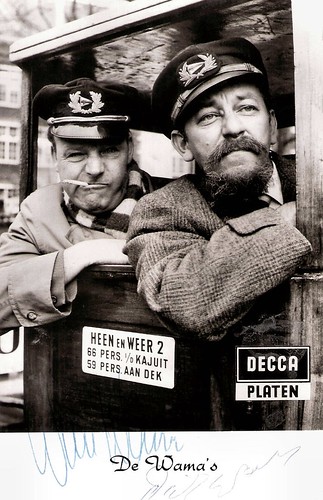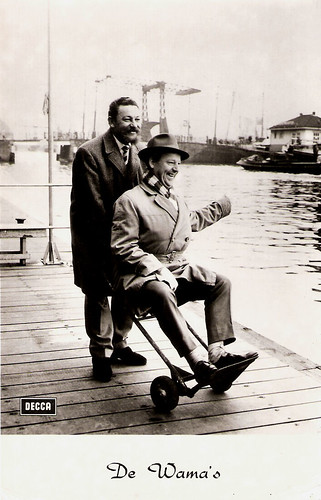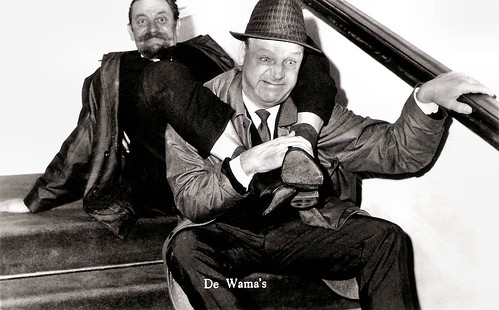
Dutch postcard. Photo: Decca.

Dutch postcard, no. 1 62 D 724. Photo: Decca.
Need for light entertainment
Wim van Wageningen (1918-1986) and Dick de Maat (1917-1980) met in the army after mobilization. In 1940 they decided to become artists and form a duo. As a name for the new duo they chose ‘De Wama's’, the first two letters of their surnames, Van Wageningen and De Maat. They took on the stage names Wim Wama and Dick Wama.
After the war De Wama's continued as professional artists. They took advantage of the need for light entertainment that arose after 1945.
In the late 40s they wrote the song Naar de TT Race (To the TT race) on the motorcycling event Dutch TT in the city of Assen. It became a hit. Other famous songs from that period are Hotsjek and Ping en Pong (1955, Ping and Pong), about two ping pong playing Chinese.
Their occasional performances in the popular radio show De bonte dinsdagavondtrein (The colourful Tuesday Night Train) made them nationally known. As a result, they were much sought after artists on the gig circuit, where they became famous for their practical jokes, both on and off stage. Wim did a great Popeye imitation and Dick made fun of the Swedish diva Zarah Leander with a silk shawl and a cigarette pipe.
From the 1960s on, the popularity of vaudeville diminished and thus the popularity of De Wama's. They were not very innovative and in contrast to another popular duo, De Mounties, De Wama’s were little seen on television.
In the 1960s they had success with parodies of famous hit songs. Their covers include Mack the Knife by Bobby Darin and Laila by Die Regento Stars, both in 1960. Their Dutch version of Kriminal tango, which was a hit in West Germany for the Hazy Osterwald Sextett, made the Dutch charts in 1960. In 1962 the Wama's pulled again the charts by responding to the twist craze. They built Franz Liszt's Liebestraum into the Liebestraum twist.

Dutch postcard.

Dutch postcard, no. 5 60 D 24. Photo: Decca.
Hadjememaar
Around Carnival 1971 the Wama's had their final hit with A Ha, Dat Is Marie (Aha that is Marie), a cover of the French song La petit Marie by Jean Marie Mourou & Nicolas Péridès. Then De Wama's focused on theatre.
In 1971 they played small roles in the play Liefde is Hadjememaar (Love is Hadjememaar) of the Amsterdam Volkstoneel, led by Beppie Nooij. Here it appeared that Wim Wama had good acting skills.
In March 1973, De Wama's parted, but they retained their stage names, Wim Wama and Dick Wama.
Wim Wama had in the 1970s and 1980s success as an actor, both in the theatre, on TV and in films. He was also a voice actor for several foreign animated series. He spoke the voices of Jerom and Krimson in the puppet series Suske en Wiske/Spike and Suzy (1975) and he performed in radio plays including the popular series De Brekers (The Breakers) with Piet Römer.
His films include the war drama Pastorale 1943 (Wim Verstappen, 1978), the thriller De schorpioen/The Scorpion (Ben Verbong, 1984) and the prostitution drama Gebroken spiegels/Broken mirrors (Marleen Gorris, 1984).
He had his biggest stage role in 1984 with the part of hobo, street musician and local politician Hadjememaar in the remake of the play Liefde is Hadjememaar (Love is Hadjememaar) from 1971. In 1986, he would star in the play In Holland staat een huis (In Holland there is a house), but he was seriously ill that year. At the age of 67, he died from cancer in 1986.
Dick Wama had an alcohol addiction and was as an actor much less successful than Wim. Later he also landed in a wheelchair after a car accident. He died in 1980 at the age of 63 in Amsterdam from a stomach haemorrhage.

Dutch postcard, no. D 1196. Photo: Decca.

Dutch postcard by Gebr. Spanjersberg, Rotterdam (Sparo).
De Wama's perform Kriminal Tango. Source: Creepingyves (YouTube).
Sources: Wikipedia (Dutch) and IMDb.
No comments:
Post a Comment